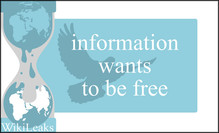 WikiLeaks – Information wants to be free
WikiLeaks – Information wants to be free According to Publica, which was founded by a team of women journalists earlier this year, WikiLeaks partnered with the outlet to encourage a closer look at leaked US embassy cables relating to Brazil.
In November last year WikiLeaks began publishing the first batch of more than 250,000 secret and confidential diplomatic cables sent by US embassies around the world.
Earlier this year WikiLeaks founder Julian Assange pledged to step up publication of the US cables through its media partners.
In a video posted on the Publica website, Assange is shown announcing the latest partnership.
"Over the last six months we have released a lot of material about the activities of the US around the world and other countries the US is looking into," he says.
"That includes Brazil. However, the materials that have been released so far about Brazil are not sufficient. There is a lot more material in the Cablegate release and a lot more that needs to be closely looked at.
"There's a history of Brazil that the people have a right to know and understand and I hope in the coming months Publica and us will bring that to you."
Today the site begins its "WikiLeaks Week", when it says it will publish around 50 diplomatic documents for the first time concerning Brazil.
In a report outlining the work undertaken to uncover the material, the group reveals it had 15 reporters working on 2,500 documents over three days.
"WikiLeaks Week is a collective initiative, led by the public with the support of Wikileaks and the participation of independent journalists who believe that stories of public interest should be counted," the report says (translated using Google Translate).
"On 10, 11 and 12 June, these journalists gathered at the headquarters of Publica voluntarily, in Barra Funda, to read all documents relating to Brazil that have not been published on the Wikileaks site.
"In addition to documents from the embassy in Brazil and the consulate in Sao Paulo, Recife and Rio de Janeiro, Publica also had access to orders in other embassies, referring to Brazil.
"These are unpublished documents produced between 2004 to 2010, discussing major national issues."
WikiLeaks had not responded to a request for comment at the time of writing.
Image by Oliver Tacke. Some rights reserved.
Related content:
Wall Street Journal launches new WikiLeaks style site safehouse
Budding journalists get insights from award-winning investigative reporter
Al Jazeera journalist's six years in Guantanamo due, in part, to role at network
New York Times receives ethical journalism award for WikiLeaks coverage
Free daily newsletter
If you like our news and feature articles, you can sign up to receive our free daily (Mon-Fri) email newsletter (mobile friendly).
Related articles
- The legacy of WikiLeaks, with award-winning journalist James Ball
- South American journalists use social media to publish uncensored versions of their investigative stories
- Data journalists, unite! How data journalism is evolving in Brazil
- Why the largest newspaper group in Brazil uses Facebook as a subscription funnel
- Inside Agência Pública, the Brazilian investigative journalism agency led by women











